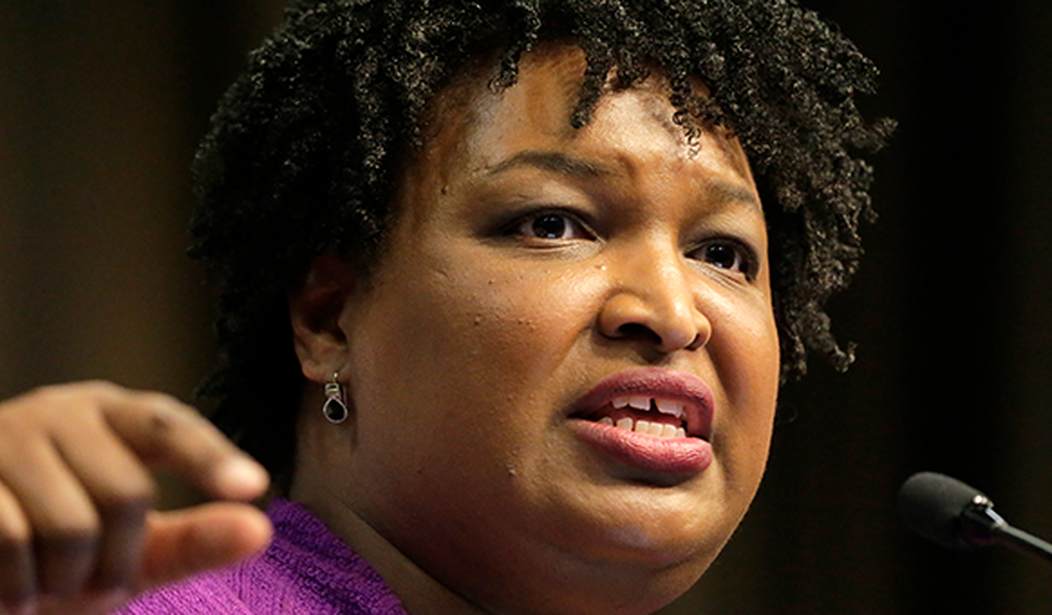Stacey Abrams’s voting rights organization was called Fair Fight. You may think this means she wants free and fair elections that follow the law passed by duly elected legislators. You would be wrong. She worked tirelessly to implement fraud-ridden processes like drop boxes and to remove signature matching requirements. Abrams’ group accomplished all this outside of the legislative process.
Many Georgians were unaware of these changes, which were brought to light in the aftermath of the general election on November 3rd. Led by the disaster known as Fulton County, the entire state became an embarrassment for residents who had faith in our election process. Now, voters are questioning if their legal vote will count during the Senate run-off on January 5th. Stacey Abrams doesn’t care. Neither does her sister. Her sister is a judge.
Two Georgia counties were attempting to remove residents who had formally changed their address from voter rolls. The total number was approximately 4,150. Given that 40 million people submit a change of address form every year to the postal service, this is hardly an overwhelming number.
But Stacey Abrams sister, Leslie Abrams Gardner, a judge in U.S. District Court, decided that no such voter roll cleanup will happen:
“Defendants are enjoined from removing any challenged voters in Ben Hill and Muscogee Counties from the registration lists on the basis of National Change of Address data”, Gardner wrote in the order.
The U.S. Postal Service maintains the National Change of Address data. One would have to assume this is probably the most accurate database since they receive the requests. Also, Georgia law allows voters removed from the rolls to cast a provisional ballot and then provide proof that they are a legal Georgia voter.
All Judge Abrams Gardner’s ruling does, even if no illegal ballot is cast, is continue the erosion of faith in the validity of Georgia’s elections. The perceived conflict of interest due to the family relationship does not help. In 2018 it was mistakenly reported Abrams Gardner ruled in a case regarding her sister’s race against Kemp. For some, the record was never corrected.
Maintaining voter rolls is a requirement under federal election law. Georgia’s process is more forgiving than Ohio’s, which was upheld by SCOTUS in June of 2018. Still, Democrats and their pit bull lawyer Mark Elias, have been tweaking election laws nationwide in a series of lawsuits. Georgia has been no exception.
The accusations levied at Georgia, other southern states that may have been part of the Confederacy, and ones run by Republican governors, generally revolve around some alleged desire to suppress black people’s votes. Unfortunately, this is a charge that seems to intimidate leaders in these states — and it should not. There is no data to back it up.
The 2018 gubernatorial race in Georgia is a perfect example. Stacey Abrams was all over the media crying “voter suppression” before and after the election. She has never conceded, continued to make these allegations, and has never provided evidence. And other Democrats still echo her claim.
Brian Kemp was elected Secretary of State in 2010. To hear Abrams talk in 2018, you would have thought he could be found in the basement of the government offices personally lighting minority voters’ registrations on fire. In actuality, his office administered the voter roll maintenance required by state law. The law in Georgia is more forgiving than Ohio’s, which was upheld by the Supreme Court in June of 2018.
Following Abrams’ incessant squawking, the Atlanta Journal-Constitution analyzed registration data in 2019. The AJC is no right-wing outlet. Still, they found:
The vast majority of people whose registrations could be canceled — 62% — moved away, according to a list made public last week by the secretary of state’s office. Either they filed change-of-address forms showing they moved to a different county or state, or their mail from election officials was returned as undeliverable.
The remaining 120,561 registrations set for cancellation are matched to voters who haven’t cast a ballot since spring 2012 or before, according to the state’s list. Voter registrations can be canceled after three years of inactivity followed by no contact with election officials during the next two general elections.
Even more important, there was no disparate impact on minority voters:
Among those who identified their race to state election officials, 31% of those whose registrations could be canceled are black, while 33% of all registered voters are black. About 63% of the cancellation list is made up of white voters, who account for 59% of all registered voters.
David Harsanyi provides an additional data point in the Daily Signal. Under Secretary of State Brian Kemp:
Minority voting, despite state voter ID requirements and despite voter registration purges, surged in Georgia, with black voter registration increasing from 43% in 2014 to 60% in 2017—higher than the percentage among white registration.
Georgia’s fortunes mirror a national trend. According to the Census Bureau, black turnout nationally grew around 27% in 2018. A Pew Research Center study found that “all major racial and ethnic groups saw historic jumps in voter turnout.”
Democrats are really going to have to find better excuses for losing in Georgia, starting with Raphael Warnock and Jon Ossoff. And the Abrams sisters should be ashamed for the actions they undertook to undermine the faith Georgians have in their election process.










Join the conversation as a VIP Member